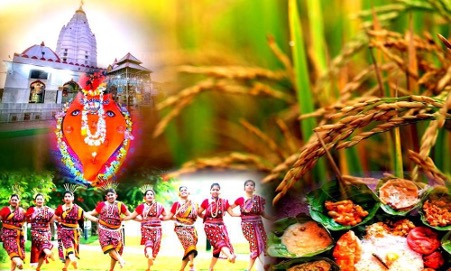Nuakhai – The Day Families Come Home
Every year, in late August or early September, western Odisha celebrates Nuakhai. Nuakhai is derived from “Nua” and “Khai”, where “Nua” means “new” and “Khai” means “eat” or “food”. Nuakhai symbolizes the ritual of partaking in the first crop of newly harvested rice. The festival falls on Bhadraba Shukla Panchami, the day after Ganesh Chaturthi. Western Odisha comes alive with music, colors, and the scent of fresh harvest.
Festival line with Goddess Samaleswari, newly harvested crop, there we do puja and dedicate it to Maa Samaleswari, after that, people of western Odisha eat the freshly harvested crop like-
- Nabanna – rice cooked from the fresh harvest, often offered to the deities first.
- Arisa pitha – a deep-fried sweet made with rice flour and jaggery.
- Kakara pitha – sweet fried cakes made from semolina or wheat flour with coconut and jaggery.
- Manda pitha – steamed dumplings stuffed with coconut and jaggery.
- Chakuli pitha – soft, dosa-like pancakes made from rice and black gram batter.
- Dalma – lentils cooked with vegetables and tempered with ghee and spices.
- Saga bhaja – stir-fried leafy greens.
- Kheeri – rice pudding made with milk and sugar or jaggery.
- Pakhala – fermented rice water, often served for a light meal in rural areas.
There are specific rules for celebrating Nuakhai. Before Nuakhai, all homes, Offices, Warehouses, etc., need to be clean (e.g., in India, people clean during Diwali). After that, during Nuakhai, newly harvested rice or the dishes made from it (such as Kheer, Arisa Pitha, etc.) are offered to Goddess Samaleswari at an auspicious time. Then, we people consume it, and after eating, it is a tradition to do Nuakhai Juhar, which means touching elders’ feet and exchanging respect.
Nuakhai is not just about eating together; it’s about bringing the whole family under one roof, meeting relatives after a long time, taking blessings from elders, and enjoying each other’s company. People greet each other with “Nuakhai Juhar” to wish happiness and prosperity. It feels like a mix of family get-together, Thanksgiving, and cultural celebration all happening on one special day.
Once the rituals and family meals are complete, the entire place comes alive with color, music, and dance. Women wear beautiful Sambalpuri sarees, while men put on traditional dhotis or kurtas. The sound of drums and local instruments, such as the dhol, nishan, tasa, and mahuri, fills the air. People gather in open spaces to enjoy folk dances like Dalkhai, Rasarkeli, and Maelajada, often with everyone joining in. The fun continues late into the night, blending faith, happiness, and togetherness.
Nuakhai still matters because it reminds us to express gratitude to the land for providing us with food. It keeps our farming traditions alive, brings families and neighbours together, and helps people stay connected to their culture, even if they live far from home. Nuakhai is now celebrated not just in villages, but also in big cities and even in other countries. People living away from home meet for Nuakhai Bhetghat, wear traditional clothes, eat festive food, dance, and greet each other with “Nuakhai Juhar,” so they can feel the same joy and togetherness even being far from Odisha.
Nuakhai is not just about eating the first harvest; it’s about thanking nature for its blessings, honouring the hard work of farmers, and spending precious time with family and friends. It’s a day filled with love, respect, and togetherness, where everyone greets each other with warmth and happiness. Whether celebrated in a small village in western Odisha or a faraway city across the world, the spirit of Nuakhai remains the same. It keeps our traditions alive, connects us to our roots, and reminds us that no matter where life takes us, home is where our culture and people are.
By Aman Meher, BBA student at the KIIT School of Management.


Informative!
Keep informing people about our great culture and tradition.
🫶🏻❤️